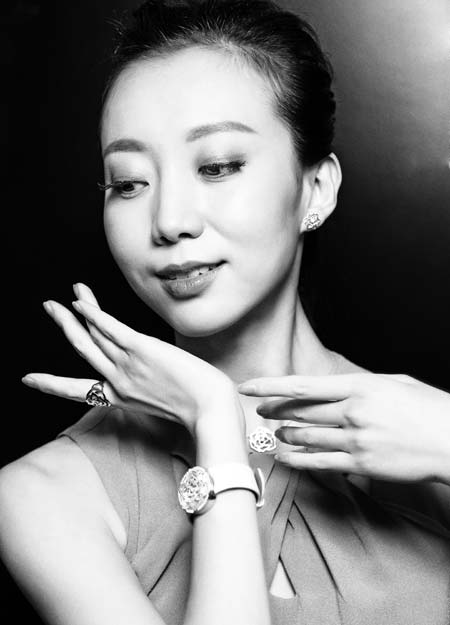
Liu Yan poses with children from her charity dance class, Angel's Smile photographer Chen Mingsheng and Thomas Bouillonnec, managing director of Piaget China.
For many people, memories of the olympic Games in Beijing may have begun to fade - but for liu Yan, the 2008 event changed her life.
liu, 32, who was set to lead in the dance performance Silk Road at the opening ceremony of the Games, fell from a 3-meter-high malfunctioning platform during a rehearsal. The accident resulted in nerve and spinal damage, paralyzing her lower body and ruining her career as a classical Chinese dancer.
Six years later, she has returned to the stage, as lead dancer in The Red Thread. The modern dance piece featured as part of the ongoing Festival Croisements 2014 to celebrate 50 years of diplomatic relations between China and France.
Following a national tour of The Red Thread that ended in May, she unveiled an exhibition of photographs in Beijing, seeking to highlight the smiles of children who took free dance lessons offered by her charity.
The exhibition, Angel's Smile, is liu's tribute to the children, many of whom are either orphans or have hearing difficulties.
"Children are able to smile in the face of their adversity. Very few people actually know what they are really going through. This is the kind of spiritual power that I want to bring to everybody," liu says.
This year, French luxury watchmaker and jeweler Piaget collaborated with liu's charity to sponsor 162 children to
take dance classes next year

Though partially paralyzed, Liu is still active onstage, and uses her upper body to perform.
"Although she went through many hard times, she keeps on fighting. And we admire her for that," said Thomas Bouillonnec, managing director of Piaget China, at the exhibition's opening on June 5.
Two years after her injury, liu set up a charity in her name to help disadvantaged children access art education, including free dance lessons.
During her mentoring of the children, she initially found them to be introverted and unable to execute with the confidence of young people with an "easier" childhood.
"They just couldn't. We didn't even start to move and were just standing, but within a few seconds, half of them started to look away," liu says. "That sight will break your heart because you can sense their lack of confidence."
But six months of dance lessons changed all that, she adds, for the better. The children unconsciously smiled while looking at their teacher and waiting for their class to begin.
"When their bodies move, their hearts follow. Their smiles were more attractive to me than their dance moves. Every time I saw them smile, I cheered up. It was magical."
The smiles of her students drove her to launch an exhibition of photographs because she wanted to share her experiences with a wider audience.

